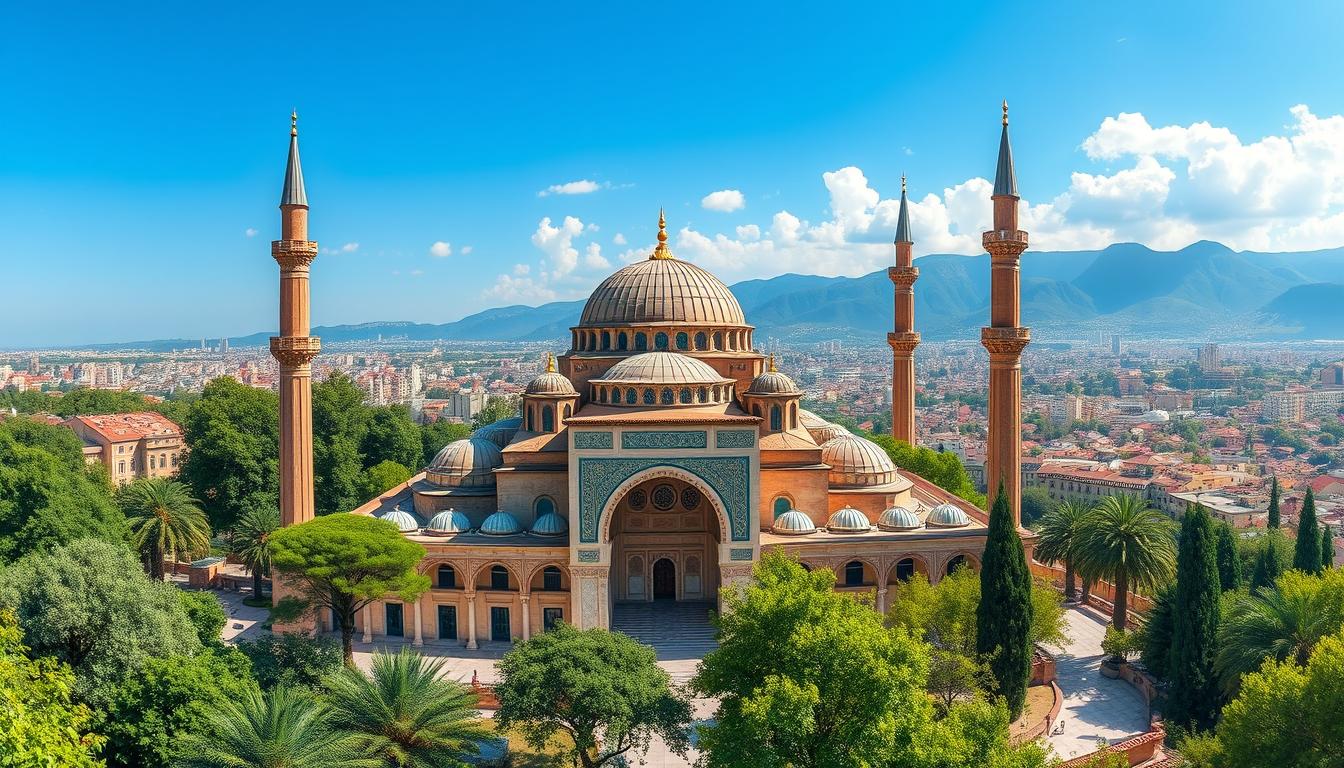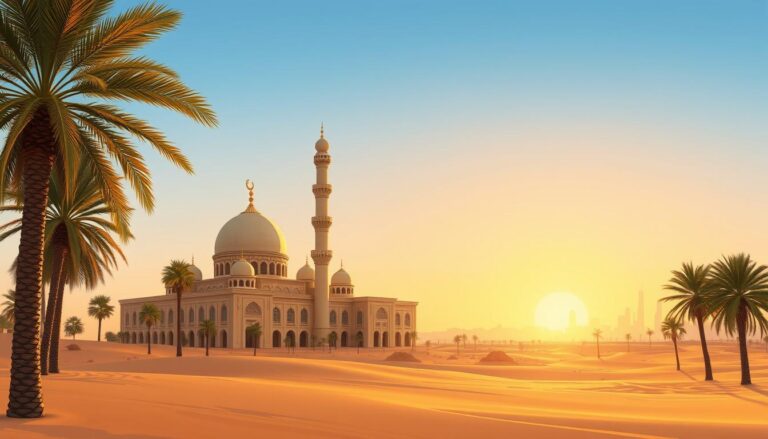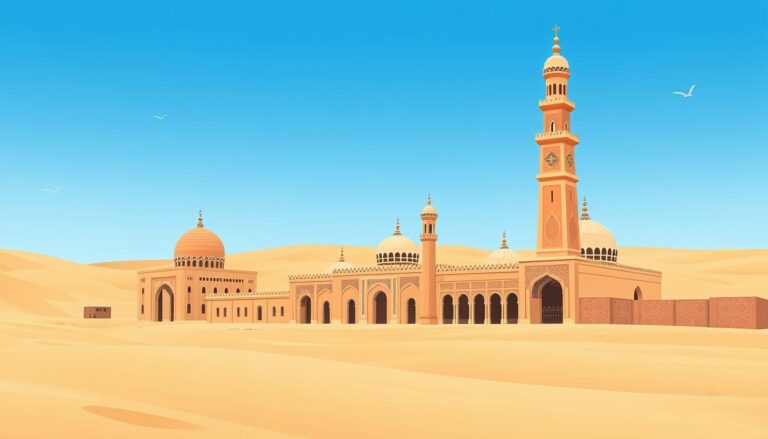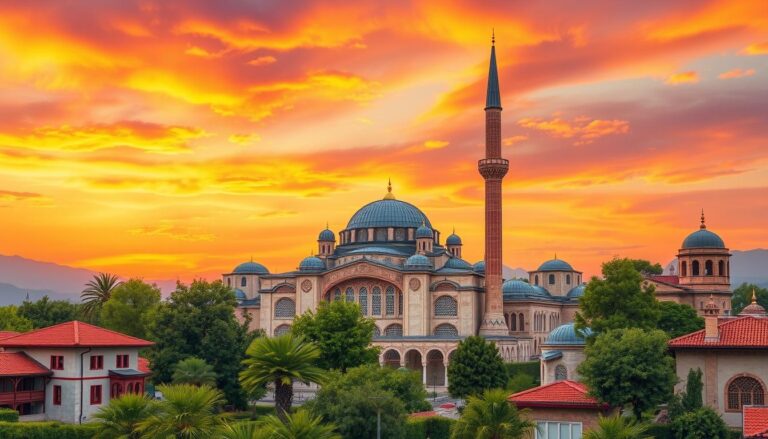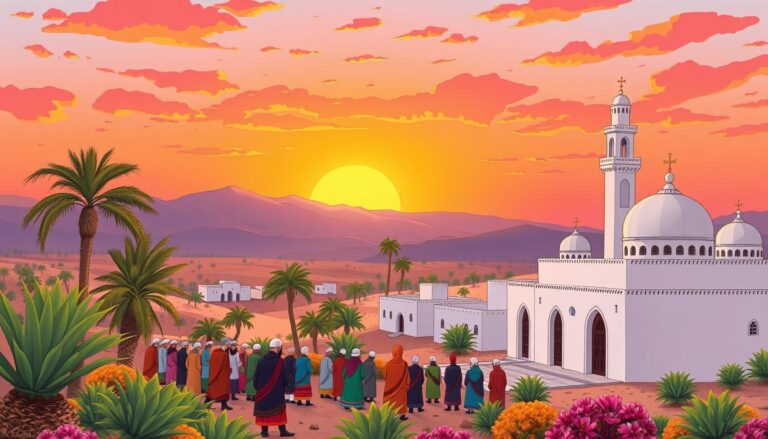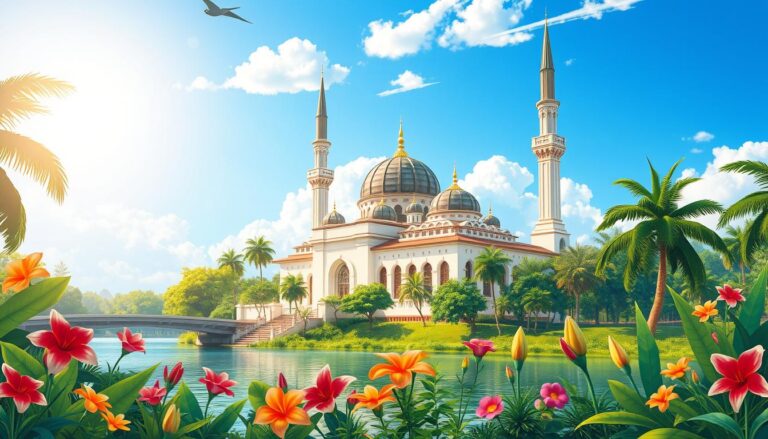Islam in Lebanon
About 63% of Lebanon’s total population follows Islam, a big jump from the 1950s. Sunnis and Twelver Shias each make up around 31% of the people. Other Shia groups like Alawites and Ismailis have smaller numbers.
The Druze community is also counted among Lebanon’s Muslim groups, even though many Druze don’t see themselves as Muslims. Islam has deeply influenced Lebanon’s culture, society, and politics for centuries.
Introduction to Islam in Lebanon
Islam has been a part of Lebanon for over a thousand years. It is a big part of the country’s religious scene. Today, about 63% of people in Lebanon follow Islam, up from 40% in the 1950s.
Brief Overview of Islam’s History and Significance in Lebanon
Islam has greatly influenced Lebanon’s culture, society, and politics. Its presence is strong and deep in the country. This makes it key to understanding Lebanon’s religious diversity and its growth over time.
Estimated Percentage of Muslims in Lebanon’s Population
About 59.5% of Lebanon’s people are Muslim, according to estimates. However, the exact number is hard to know because no official census has been done since 1932. Still, the Muslim community is a big and important part of Lebanon’s diverse religious scene.
“Islam has been a central part of Lebanon’s identity for over a millennium, shaping the country’s cultural, social, and political landscape in profound ways.”
Major Islamic Denominations in Lebanon
Lebanon is a place of diverse Islamic beliefs, with Shia and Sunni Islam being the main ones. Shia Islam in Lebanon makes up about 27%-29% of the people. The Twelver Shias are the biggest group, with Alawites and Ismailis making up smaller parts. The Speaker of the Lebanese Parliament is always a Shia Muslim, showing their strong political role.
Sunni Islam in Lebanon also has a big share, making up 27%-29% of the population. The Sunni community is mainly found in areas like west Beirut, Tripoli, Sidon, and the Beqaa Valley. The Hanafi and Shafi’i schools of thought are the main Sunni groups.
Both Shia Muslims in Lebanon and Sunni Muslims in Lebanon are key in the country’s social, political, and religious life. They add to the rich diversity that makes up the Lebanese identity.
“The Lebanese state grants religious leaders powers over religious affairs including personal-status courts, endowments, places of worship, and education.”
The relationship between Shia and Sunni Muslims in Lebanon shapes the country’s politics and society. It often leads to tensions and power struggles. Knowing about Shia Islam in Lebanon and Sunni Islam in Lebanon helps understand the complex religious scene in the country.
Distribution and Demographics of Muslims
The Muslim population in Lebanon is spread out across different parts of the country. Shia Muslims live mainly in the Beqaa Valley, Southern Lebanon, and parts of Beirut. Sunni Muslims are found in cities like Tripoli, Sidon, the Beqaa Valley, and northern regions.
Geographic Distribution of Muslim Communities
About 67.6% of Lebanon’s population is Muslim. Sunni Muslims make up 31.9%, and Shia Muslims are 31%. There are also smaller groups like Alawites and Ismailis.
- Shia Muslims are mostly in northern and central Beqaa, Southern Lebanon, and southern Beirut.
- Sunni Muslims are mainly in west Beirut, Tripoli, Sidon, and northern Lebanon. They also live in the middle and West Bekaa, Chouf district, Laqlouq in Mount Lebanon, Hasbaya district, and the Northeastern Beqaa Valley, especially around Arsal.
The way Muslims are spread out in Lebanon shows the country’s rich religious and cultural mix. Different sects and denominations live together within the Islamic faith.
Islam in Lebanon
Islam is deeply woven into Lebanon’s politics and society. It plays a key role in the country’s identity and how it is governed. The National Pact is an agreement between leaders. It sets rules for sharing power, ensuring representation for different religions.
This pact means the president is always a Maronite, the Prime Minister a Sunni, and the Speaker a Shiite. This system makes sure Sunnis and Shias have a voice in government.
Islamic institutions and practices also shape Lebanese society. Religious leaders handle important life events like marriage and divorce. They also manage inheritance, showing how Islamic values are deeply rooted.
Moreover, Islamic schools and centers of learning help keep Islamic knowledge alive. They spread Islamic culture across the country.
“Islam’s influence in Lebanon extends beyond the political sphere, with Islamic institutions and practices playing a crucial role in shaping the country’s social fabric.”
The role of Islam in Lebanese politics and society is clear. Islamic institutions and practices are key to the Lebanese identity. They shape the nation’s culture and traditions.
Historical Significance of Islam
The Islamic heritage in Lebanon has deeply influenced the country’s culture and traditions. The architectural styles, artistic expressions, and social practices of the Lebanese people have been shaped by Islam. The intricate design of religious structures and the observance of Islamic holidays and rituals show the impact of Islamic heritage.
The influence of Islam is seen in Lebanon’s diverse architecture. Mosques, with their unique domes and minarets, are landmarks that highlight the religion’s history. These sacred spaces are not just for worship but also showcase Islamic builders’ skill and legacy in Lebanon.
Islamic heritage also affects Lebanese art. Traditional crafts like calligraphy, metalwork, and textile weaving often feature Islamic motifs. This shows the strong connection between the religion and Lebanon’s artistic heritage.
Islamic festivals and rituals are a big part of Lebanese culture. Events like Eid al-Fitr and Eid al-Adha are celebrated with great enthusiasm. They have become key parts of the Lebanese cultural calendar.
The historical significance of Islam in Lebanon shows its lasting impact on the country’s identity and way of life. The Islamic heritage continues to shape Lebanon’s architecture, art, and society. It leaves a lasting mark on the rich tapestry of Lebanese culture.
Challenges and Issues Faced
Lebanon has long struggled with sectarian tensions. These divisions have hurt Muslim communities a lot. Power struggles and conflicts between religious groups have made the country unstable and uncertain.
One big challenge is the divide between Sunni and Shia Muslims. This has sometimes led to violence and instability. It disrupts daily life and makes people feel less secure.
Another challenge is the influx of refugees, especially from Syria. Many Syrian refugees are Muslim. This has put a lot of strain on Lebanon’s resources and infrastructure.
The economic crisis in Lebanon has hit Muslim communities hard. Many struggle to get basic needs like food, healthcare, and electricity. The Lebanese currency’s value has dropped, making life more expensive.
Despite these challenges, Muslim communities in Lebanon are important. They play a big role in the country’s social, political, and cultural life. But, solving sectarian tensions and economic issues is key to their well-being and prosperity.
“The divisions and conflicts between various religious groups have created an environment of instability and uncertainty, often impacting the lives and livelihoods of Muslim citizens.”
Islam’s Influence on Lebanese Identity
Islam has deeply influenced Lebanon’s identity and sense of self. It has become a big part of Lebanese society. This includes religion, culture, and politics.
Islam has shaped Lebanon’s collective identity. Its history, role in politics and society, and cultural traditions have all played a part. These factors help Lebanese people understand who they are and their national identity.
Islam’s presence in Lebanon has left a lasting mark. It has influenced politics, culture, and society. This makes being Lebanese unique and special.
The Islamic Group, a Sunni political entity, has supported Lebanon’s ‘Hirak’ uprising. This shows how Islam and Lebanese identity are connected.
“The relationship between the Islamic Group and Iran-Hezbollah axis deteriorated due to differing views on regional conflicts, such as the Syrian war, further underscoring the complex dynamics within the country’s religious and political landscape.”
Lebanon is home to different Islamic denominations, like Shia and Sunni. Each group adds to the country’s rich culture and traditions. Islamic institutions and practices are deeply integrated into Lebanese society and politics.
In conclusion, Islam’s influence on Lebanese identity is clear. It has deeply shaped Lebanon’s sense of self. From politics and culture to social structures, Islam is a key part of being Lebanese.
Islamic Education and Institutions
Lebanon has a lively network of Islamic schools and learning centers. They are key in sharing Islamic knowledge and keeping religious traditions alive. These places are vital for the Muslim community’s education and culture.
Islamic Schools and Learning Centers
The Al-Mustafa private school network is a major Islamic educational institution in Lebanon. It was started by the Islamic Religious Education Association in 1984. These schools teach one hour of religion and another of Quran study each week. Children of Hezbollah martyrs get free tuition at Al-Mustafa schools.
The Islamic Organization for Education, linked to Hezbollah, is another important player. It has grown to 17 schools in Beirut, the Bekaa Valley, and the South. It also has a school in Qom, Iran.
The Association of Islamic Charitable Projects (Al-Ahbash) has set up Islamic schools too. The first one opened in Beirut in 1991. More schools followed in Akkar, Tripoli, Barja, and the Bekaa region.
Though Salafists in Lebanon have limited activities, Islamic education has reached many people. It plays a big role in sharing religious knowledge and building religious identity.
“Islamic education institutions in Lebanon have reached large segments of the society, while public mainstream education has been lacking in many areas until recently.”
Interreligious Dialogue and Coexistence
Lebanon faces challenges from sectarian tensions. Yet, it keeps working on understanding and dialogue between Islamic and other religious groups. Leaders and civil society groups have started many initiatives. These aim to build cooperation and respect among different faiths.
Lebanon values interreligious dialogue and coexistence. It has tried many times to bring Islamic and other religious groups closer. These efforts, led by religious leaders and community groups, aim to improve communication and work together.
Fostering Interfaith Understanding
Despite sectarian divisions, Lebanon remains committed to dialogue and coexistence. Religious leaders and civil society groups have organized many programs. These aim to increase understanding, respect, and cooperation between Islamic and other faiths.
- The National Christian-Muslim Committee for Dialogue was established in 1993 to address sectarian issues in Lebanon.
- The UNESCO Chair in Comparative Religious Studies was established in 2002 to promote intercultural dialogue, peacebuilding, and tolerance.
- The Center for Conflict Resolution and Peacebuilding (CCRP) was founded in Beirut in May 2003 to facilitate interreligious dialogue and conflict resolution.
These efforts show Lebanon’s dedication to bridging its religious communities. They aim to create a spirit of interreligious dialogue and religious coexistence despite ongoing challenges.
“Lebanon has 18 officially recognized religious sects living together on 10,452 km2, a testament to the country’s religious diversity and the need for ongoing efforts to promote understanding and cooperation.”
Conclusion
Islam has a strong presence in Lebanon, influencing its culture, politics, and religion. About 63% of people follow Islam, with Sunni and Shia Muslims being the main groups. Islamic practices and institutions are deeply woven into Lebanese life, affecting personal laws, education, and traditions.
Despite challenges from sectarian tensions, efforts to improve interfaith dialogue are ongoing. These efforts highlight Islam’s importance in Lebanon’s identity and its quest for unity. Islam’s role will remain key as Lebanon navigates its complex religious scene.
The Summary of Islam in Lebanon reveals its wide-ranging impact. From its historical role to its influence on culture and politics, Islam is essential to Lebanon. As the country progresses, Islam’s role will continue to shape its identity and strive for a more united and peaceful future.
Source Links
- Islam in Lebanon
- Lebanese Sunni Muslims
- Lebanon’s Muslims: Relatively Secular and Pro-Christian
- Fatah al-Islam (Lebanon)
- Islamist Groups in Lebanon
- No title found
- Islamism in Lebanon: A Guide to the Groups
- Briefing European Parliamentary Research Service
- Religious Authority and Sectarianism in Lebanon
- Lebanon – United States Department of State
- Demographics of Lebanon
- Lebanon – United States Department of State
- Islam in Lebanon: An Overview
- Lebanon – Medieval, Crusades, Phoenicians
- Islam’s Sunni‑Shia Divide, Explained | HISTORY
- Lebanon: The Shiite Dimension
- Lebanon (01/94)
- Lebanon’s delicate religious balance at risk amid ongoing crisis
- The Harrowing State of Women’s Rights in Lebanon
- The Islamic Group and Lebanon’s Popular Uprising* | Al Jazeera Centre for Studies
- Bridging Cultures Bookshelf: Muslim Journeys
- How Political Islam Schools Shape New Generations in Lebanon? – Raseef22
- More than holy scriptures | D+C – Development + Cooperation
- Moving Beyond: Interreligious Dialogue in Lebanon
- Christian‐Muslim Relations in the midst of Pandemic: A Case Study from Lebanon
- Militant Islam and jihad in Lebanon
- Is There Still A Lebanon?

